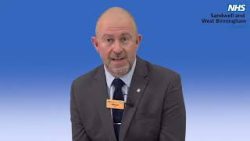Monthly archives: March 2023
Excellent Palliative and End of Life Care

This film tells the story from perspectives of local leaders, a bereaved son and clinicians how we can make a difference as we work together to improve the experience for the people and their families who we look after as they reach the end of their lives in Sandwell and West Birmingham.
With thanks to Paul Turner and his family for sharing the story of his father’s death whilst in our care.
DKMS awareness stands at Sandwell and City

Blood cancers such as leukaemia, lymphoma and myeloma are devastating diseases that affect thousands of people across the UK each year. For many patients, a blood stem cell transplant is their only hope of survival. But with only around 30 per cent of patients finding a match within their family, the need for unrelated donors is crucial. This is where the DKMS blood stem cell register comes in.
With this in mind, we are hosting DKMS awareness stands on the following dates for colleagues to drop in:
- Thursday 20 April, Sandwell outpatients area, 10.30am – 2.30pm
- Thursday 27 April, BTC first floor, City, 10.30am – 2.30pm
For more information, please email hojansenya@nhs.net.
Ramadan: Supporting colleagues who are fasting
Many colleagues who are Muslim and observe fasting during Ramadan, will participate in a daily period of fasting, starting at sunrise and finishing at sunset over the month. This means abstaining from food, drink (including water) and smoking. While fasting is an important part of Ramadan, it is also a time of self-reflection and self-evaluation for Muslims.
This year Ramadan commenced on Wednesday 22 March and is expected to last for 29-30 days.
Accommodating religious belief and practices during Ramadan is about being responsive to colleague needs. It does not necessarily mean extra time off; it is about offering flexibility around existing holiday entitlement, working patterns or break periods.
Be sure to check this video featuring Iman Salim Moolla to find out more about Ramadan.
Advice for line managers:
- Do not make assumptions about who in your team may be observing Ramadan – Islam is a faith that welcomes people of all races and backgrounds.
- Observing Ramadan may not be noticeable so make it easy for your team members to let you know if they are fasting.
- If you manage a colleague who will be observing Ramadan, ensure you have some one-to-one time to discuss any workplace adjustments that can be considered.
- Fasting can affect people in different ways (for example, some people may understandably become a little quieter or slightly tired at times, even though most staff have fed back that their productivity increased after the first few days).
- Dignity and respect from managers and colleagues are helpful and expected. Be aware that fasting colleagues will not even be drinking any fluid (including water) and they may therefore feel less energetic and even less inclined to join in office conversations on occasions – don’t take it personally and ensure communication can be made in other ways where possible.
- Workplace adjustments should not impact negatively on patient care. Managers and their colleagues can discuss and consider options such as occasional working from home where appropriate to the role and individual circumstances, core hour working where time can be made up in lieu, and provision for paid and unpaid leave where viable. When Ramadan falls in the summer months it can be particularly challenging, as the days are longer.
For further details workplace consideration during Ramadan please click here.
International Transgender Day of Visibility: 31 March

International Transgender Day of Visibility (TDOV) is an annual event on 31 March dedicated to celebrating transgender people and raising awareness of discrimination faced by transgender people worldwide, as well as a celebration of their contributions to society.
The day was founded by transgender activist Rachel Crandall in 2009 as a reaction to the lack of LGBT recognition of transgender people. The first International Transgender Day of Visibility was held on 31 March 2009.
TDOV also provides an opportunity for trans and non-binary people to feel seen through positive and realistic representation – and for allies to learn more about how they can stand in solidarity.
Heartbeat: Making data count – Improving patient outcomes with analytics

As the NHS continues to strive for excellence in patient care, it’s crucial to take advantage of the wealth of data that’s generated through daily operations and activities. By using data and analytics, the colleagues can make informed decisions that lead to significant improvements in patient outcomes, operational efficiency and cost savings.
One of the advantages of using data and analytics in decision making is that it allows Trust’s like ours to identify patterns and trends that may not be immediately obvious. For example, data analysis can reveal which patients are most at risk of developing certain conditions, allowing clinical colleagues to take proactive preventative measures. Additionally, data analysis can help identify areas where resources are being wasted, allowing us to redirect those resources to where they’re needed most.
Another important aspect of using data and analytics is that it allows us to measure the effectiveness of treatments, procedures, processes and pathways. By tracking patient outcomes over time, we can determine which treatments are working well and which ones need to be improved. This can lead to the development of more effective treatments, which ultimately results in better patient outcomes.
Putting analytics into practice
As an improvement analyst my unique role within the improvement team has led to me being involved in providing data and analytical support on projects such as mouthcare matters, ED frailty, sepsis and security escalation projects where I focussed on measuring the impact of improvement activity and the development of supporting reporting. Improvement analysis involves the measurement of process change over time.
Analysis, presentation and interpretation of data is fundamental to what we do within the improvement team. Projects are initiated, monitored and brought to a conclusion based on what the data tells us. Without datacentric evidence, benefits and outcomes are difficult to decipher, potentially leading to waste of resources and duplication of effort.
For the mouthcare matters programme we sourced data from our in-house archives to measure the cases of hospital acquired pneumonia before and after clinical intervention. This helped build the case for the intervention to be rolled out across the Trust.
How you can make the most of data
The making data count training program run by NHS England, aims to train colleagues in how to appropriately use statistical process control (SPC) charts to enhance decision making in projects across the NHS. Over an eight lesson cycle, colleagues will be introduced to the concept of SPC charts, narrative writing, comparison and benchmarking, improvement methods and data triangulation, amongst others. The overall impact of this will be to give colleagues an appreciable level of expertise in employing SPC charts in their work, and reaping the resultant benefits.
In short, using data and analytics is crucial for the NHS to continue to improve patient outcomes, operational efficiency, and cost savings. With the right data and analytical tools, the NHS can make informed decisions that lead to real, measurable improvements in the quality of care provided to patients.
Preparation for Junior Doctor Industrial Action: Temporary stand down of corporate meetings
As you are aware we are expecting a second period of industrial action by junior doctors between 11 – 14 April, the week following the Easter bank holiday weekend.
In order to enable clinical and operational teams to plan for and manage patient safety during this period we are standing down all corporate meetings from Wednesday 5 April up to and including Tuesday 18 April.
Our Tactical and Strategic Command and Control systems are in place.
Please raise any queries to your group’s tactical representative.
Heartbeat: Work experience in pharmacy proves huge success

Gavin Moore started his work experience placement in our pharmacy department in June 2021 and at the back of end of 2022, was successfully appointed as a pharmacy dispenser at SWB.
During his pharmacy work experience placement, Gavin worked across various parts of the department which gave him invaluable experience and expertise.
“I was shown many things during my placement such as how a drug history is taken and how the ward-based pharmacy teams operate,” said Gavin.
“I was also shown how the clinical trials team works and had the opportunity to rotate through the aseptic unit, where I was given the chance to dispense using the software under supervision.”
Zoe Finch, Dispensary Co-Ordinator has played an important mentoring role in Gavin’s development and believes he has thrived and flourished at SWB.
She said: “From when I first met Gavin at his interview, I could see he had a passion for healthcare. I feel strongly about creating a culture for an equal and diverse workplace. The fact that Gavin was 17 when he joined us here is not only a massive achievement for him but for us as a Trust too, as we are able to nurture Gavin with his enthusiasm to learn.
“I feel Gavin has a prosperous future ahead of him at SWB and is a credit to the organisation.”
The placement, beginning during June 2021 within the pharmacy team, has enabled Gavin to obtain a permanent role at SWB which will ultimately allow him to progress in his pharmacy career.
When asked if he would recommend work experience at the Trust, Gavin said: “It’s a great way to gain experience in something you are interested and passionate about whilst learning skills required for the job role. I would tell anyone who is undecided to just go for it because you don’t know until you try.”
He added: “If I had to give one message to younger people in a similar position to myself, I would say be resilient and open minded. As someone who didn’t want to go down the traditional university route of education, I was left wondering what route I could take. I then became aware of work experience opportunities available at SWB by contacting Nikki Smith and quickly learnt that this was something I wanted to undertake.
“I believe that you should follow what you want to do. I left school at 16 with the idea of going into healthcare but didn’t know how to achieve that until I did work experience at the Trust.”
Keep an eye out for ‘phishing’ emails – don’t fall victim to the messages
There have been a number of fraudulent ‘phishing’ emails currently circulating over the past few weeks. These emails look authentic at first glance but are carefully crafted to trick you in to clicking on them and disclosing your personal information.
Remain vigilant and if you believe an email you have received is suspicious, contact the IT department on ext. 4050 and do not click on any links.
Issues relating to fraud can be reported to our Local Counter Fraud Specialist Sophie Coster on 07436 268747 or via email sophie.coster@rsmuk.com. Alternatively, calls reporting to be from IT can be confirmed by calling our IT Servicedesk directly on 0121 507 4050.
Are you responsible for obtaining vascular access?
Colleagues who are responsible for obtaining vascular access must remember that any line insertion, assessment and removal must be documented within Unity.
Please ensure you are following the quick reference guide which is available here.
Alternatively, the quick reference guide is available via E Coach within Unity under clinical documentation.
Join our team of Freedom to Speak up Guardians
Our Trust values are Ambition, Respect and Compassion. Without an effective and healthy speak up culture we cannot live by these values. Speak up is a crucial factor in all three.
So, are you a colleague who:
- Cares passionately about Freedom to Speak Up?
- Cares passionately about building a just and fair culture in our Trust?
- Is compassionate, a listener, naturally supportive?
- Do you want to help build a culture in our Trust where there is no fear of detriment or reprisal for speaking up, where speaking up is welcomed?
Then please consider joining our team.
We are increasing the number of Freedom to Speak up Guardians in our Trust, from the current three, to ten. We are seeking expressions of interest from all professions across our workplace – preferably from colleagues who have roles from the width and breadth of the organisation to take forward this crucial function.
Our vision is to become a national leader in speak up culture; and you can help us achieve it. You will be working in a team of ten, with the lead Freedom to Speak up Guardian and the lead executive for Speak Up, Dinah McLannahan – Chief Finance Officer.
If you are successful, we will work with your line manager to agree the amount of time you will be able to dedicate to this role. You won’t have to know everything as we will give you training and support to fulfil the role.
Your role will be to promote the Speak Up culture in our Trust, and to support those that contact you with concerns. In the Speak Up team we are working to improve our data collection on Speak Up so that we can triangulate issues and themes and use the information to improve the quality and safety, and leadership culture in our Trust.
If the above interests you, please put in an expression of interest by answering the following questions, in no more than 300 words in total.
We would like to know:
- Which role you currently occupy in the Trust
- Why you want to become a Freedom to Speak Up Guardian.
- What skills and qualities you can bring that are relevant to the role.
Please send your expression of interest to swbh.freedom-to-speak-up-guidance@nhs.net by Friday 14 April.
If you would like a confidential discussion about the role, please feel free to contact our existing guardians;
- Harpal Tiwana – 07828559542
- Sandra Kennelly – Sandra.kennelly@nhs.net
- Cheryl Newton – Cheryl.newton@nhs.net
- Dinah McLannahan – Dinah.mclannahan@nhs.net
Further information about Freedom to Speak Up is available from the National Guardian’s Office website www.nationalguardian.org.uk
← Older items